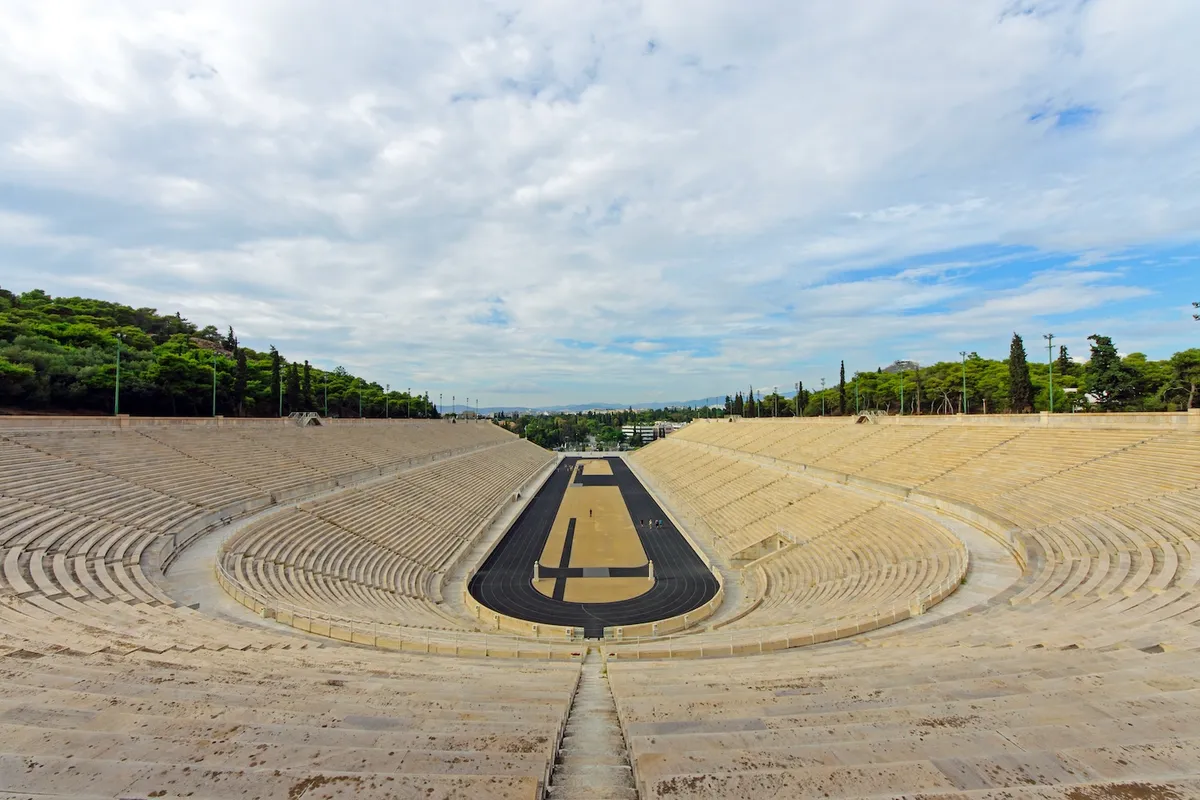The Olympic Games have been a beacon of athletic glory and international unity for over a century. The spirit of competition, determination, and camaraderie that is celebrated during the games transcends boundaries, bringing together athletes from all corners of the globe. But beyond the athleticism and the exhilarating moments on the field, the Olympic Games hold a rich and fascinating history that continues to captivate people around the world. In this article, we delve into the legacy of the Olympic Games, exploring the deep intertwining of sport and history that makes this event so truly extraordinary. From its ancient origins to its modern-day incarnation, the Olympic Games have left an indelible mark on both the sporting world and the global community at large. So grab a seat and prepare to embark on a journey that uncovers the stories, triumphs, and enduring legacy of the Olympic Games.

The Evolution of Olympic Games: From Ancient Origins to Modern Spectacles
The Olympic Games have come a long way since their ancient origins. What began as a modest athletic competition in ancient Greece has now transformed into a global spectacle that showcases the best athletes from around the world. The history of the Olympic Games is rich and fascinating, tracing back to the 8th century BCE.
The Ancient Olympic Games were held every four years in Olympia, Greece, and were dedicated to the god Zeus. The games were a symbol of unity, where athletes from different city-states would compete in various events, including running, wrestling, and chariot racing. These ancient games were not just about physical prowess but also served as a display of honor and glory.
Fast forward to the present day, and the Olympic Games have evolved into a breathtaking affair. The modern Olympics were first held in Athens in 1896 and have since grown exponentially in scale and grandeur. With each edition, the Olympic Games have become a platform for countries to showcase their sporting talents, as well as their cultural heritage and national pride.
Today, the Olympic Games are a global phenomenon, attracting billions of viewers worldwide. The event has become a celebration of athleticism and a symbol of camaraderie among nations. From the ancient arenas of Olympia to the state-of-the-art stadiums and Olympic villages, the Olympic Games have transformed into a monumental showcase of human achievement and international unity, leaving spectators in awe and athletes yearning for glory.
Exploring the Global Impact of the Olympic Games Through the Ages
The Olympic Games are one of the most iconic and internationally recognized sporting events in the world. Since their inception in ancient Greece, the Games have grown in scale and significance, leaving a lasting imprint on global culture and society. From showcasing athletic excellence to promoting unity and peace, the Olympic Games have become a platform for nations to come together and celebrate the power of sport.
Throughout history, the Olympic Games have had a profound impact on various aspects of society. One of the notable effects is the economic boost that host countries experience. From infrastructure development to tourism, the Games provide a platform for the host city and country to showcase their capabilities on a global stage. Rio de Janeiro, for example, witnessed a significant increase in tourism and investment following the 2016 Olympic Games.
Beyond the economic impact, the Olympic Games also serve as a catalyst for social change. Throughout the years, athletes have used their platform to advocate for important causes, from racial equality to gender equality. These games have helped break barriers and challenge societal norms, paving the way for greater acceptance and inclusion. The representation of diverse nations and cultures coming together in peaceful competition helps foster understanding and promotes a sense of global community.
As the Olympic Games continue to evolve, they will undoubtedly continue to leave a lasting impact on the world. From influencing urban development and social change to promoting global unity and cultural exchange, the Games transcend sports to become a symbol of internationalism and cooperation. Whether it is the awe-inspiring performances of athletes or the diverse cultural celebrations, the Olympic Games continue to captivate audiences worldwide and serve as a reminder of the power of unity and human achievement.

Captivating Stories Behind the Triumphs and Challenges of Olympic Athletes
The Olympic Games have always been a platform for athletic excellence and extraordinary achievements. Behind every gold medal, there is an awe-inspiring story of determination, perseverance, and the overcoming of enormous challenges. These captivating stories not only inspire us, but they also remind us of the indomitable human spirit.
Take the story of Simone Biles, one of the greatest gymnasts in history. Although she has won countless Olympic medals, her journey to success was far from smooth-sailing. Biles faced numerous obstacles, including mental health issues and the pressure to perform at an unparalleled level. Despite these challenges, she demonstrated immense strength and resilience, captivating the world with her incredible routines and breaking records in the process.
Similarly, the story of swimmer Michael Phelps is one that continues to captivate audiences worldwide. Throughout his Olympic career, Phelps confronted personal demons, including struggles with depression and anxiety. Despite these hurdles, he became the most decorated Olympian of all time, proving that even in the face of adversity, greatness can still be achieved.
Behind every athlete’s triumph at the Olympic Games lies a multitude of unique and awe-inspiring stories. These stories remind us that success is not always measured in medals, but in the unwavering spirit and relentless determination to achieve greatness. So, the next time we watch the Olympic Games, let’s remember that every athlete is a hero in their own right, and that their captivating stories will continue to inspire us well beyond the Games themselves.
The Intersection of Culture and Competition: Olympic Games Through a Historical Lens
The Olympic Games have long been a symbol of unity and competition, bringing together athletes from different cultures and backgrounds to showcase their skills on an international stage. From its humble beginnings in ancient Greece to the grand spectacles of modern-day Olympics, this global sporting event has always been intertwined with the complexities of culture.
Throughout history, the Olympic Games have served as a platform for nations to not only display their athletic prowess but also to express their national identity and pride. The opening ceremonies, with their elaborate displays of culture and heritage, provide a glimpse into the rich traditions and customs of the host country. From traditional music and dance to costumes and rituals, these performances offer a window into the diverse cultures that make up our global community.
Moreover, the Olympics have often been a catalyst for social and political change. In 1936, the Berlin Olympics became a stage for Nazi Germany to promote their ideologies. However, African-American athlete Jesse Owens’s stunning victories shattered Hitler’s notion of Aryan supremacy, challenging the prevalent racism and discrimination. Similarly, the 1968 Mexico City Olympics saw African-American sprinters Tommie Smith and John Carlos raise their fists in a symbolic protest against racial inequality, sparking conversations and debates worldwide. These instances demonstrate how the Olympic Games have the power to amplify social and cultural issues that go beyond the realm of athletics.
As the world continues to evolve, so too do the Olympic Games. In recent years, there has been a greater emphasis on inclusivity and diversity within the event. Discussions around gender equality, LGBTQ+ rights, and indigenous representation have gained prominence, pushing the boundaries of cultural acceptance and understanding. The Olympic Games serve as a reflection of our society, highlighting both the progress we have made and the challenges we still face.
In conclusion, the intersection of culture and competition at the Olympic Games is a testament to the power of sport as a unifying force. It enables us to celebrate our shared humanity while appreciating the rich tapestry of cultures that make up our global community. As we eagerly await each edition of the Olympics, let us remember the historical significance behind this extraordinary event and the role it plays in shaping our world.
Unforgettable Moments in Olympic History: Records Broken and Legends Born
The Olympic Games have always been a platform for athletes to showcase their extraordinary talents and push the boundaries of human capability. Throughout history, there have been countless unforgettable moments that have left an indelible mark on the Olympic stage. From records being shattered to legends being born, these moments have captivated the world and instilled a sense of awe and admiration for the athletes involved.
One of the most iconic moments in Olympic history occurred in 2008, when swimmer Michael Phelps achieved an unprecedented feat by winning a record-breaking eight gold medals in a single Games in Beijing. His dominance in the pool not only solidified his status as one of the greatest Olympians of all time but also showcased the immense dedication and perseverance required to reach such extraordinary heights. Phelps’ achievements will forever be etched in Olympic history as a testament to the power of determination and self-belief.
Another unforgettable moment took place during the 2000 Sydney Olympics when British runner Cathy Freeman won the gold medal in the women’s 400 meters. The significance of this victory extended far beyond the athletic prowess displayed by Freeman. As an Aboriginal Australian, she became a symbol of hope and reconciliation for Indigenous people worldwide. Her triumph on the Olympic stage not only shattered records but also broke down barriers and inspired a generation.
Perhaps one of the most legendary moments in Olympic history is the “Miracle on Ice” during the 1980 Winter Olympics in Lake Placid. The underdog U.S. Men’s Ice Hockey Team, composed of amateur and collegiate players, defeated the heavily favored Soviet Union in a stunning upset. This victory not only captured the spirit of the American dream but also transcended sports, bringing a nation together during a time of political tension and uncertainty. The “Miracle on Ice” serves as a reminder of the power of teamwork, determination, and the ability to overcome seemingly insurmountable odds.
In the world of sports, there are moments that transcend time and continue to inspire generations. These unforgettable moments in Olympic history remind us of the extraordinary capabilities of the human body and the resilience of the human spirit. Whether it be record-breaking performances or triumphant victories against all odds, the Olympic Games provide a stage for athletes to leave an everlasting legacy and inspire the world to reach for greatness.

How the Olympic Games Have Shaped International Relations and Unity
The Olympic Games have long been a symbol of unity and cooperation among nations. Dating back to ancient times, this global sporting event has transcended borders and brought people from different countries together. Through the spirit of competition, athletes have showcased their talents, while also fostering understanding and mutual respect. The Olympic Games have played a significant role in shaping international relations, promoting peace, and fostering a sense of unity among nations.
One of the ways in which the Olympic Games have impacted international relations is by providing a platform for dialogue and diplomacy. During the games, athletes from various nations come together to compete under the same set of rules, creating a level playing field. This allows for interactions between individuals from different cultures and backgrounds, promoting cultural exchange and understanding. These encounters often lead to the forging of friendships and alliances, which can have a lasting impact on diplomatic relations between nations.
Moreover, the Olympic Games have been a source of inspiration for nations to put aside their differences and work towards a common goal. The games have acted as a catalyst for peace, pushing countries to set aside political and social conflicts for the duration of the event. This temporary ceasefire allows for dialogue and bridges to be built, fostering a sense of togetherness and unity. Furthermore, by competing side by side, nations are able to showcase their strengths and talents, which can inspire admiration and respect among participants and spectators alike.
Lastly, the economic and cultural impact of the Olympic Games cannot be underestimated. Hosting the games provides an opportunity for nations to showcase their heritage, culture, and infrastructure to the world. This exposure can lead to an increase in tourism and foreign investment, boosting the host country’s economy. The collaborative efforts required to organize such a massive event also promote international cooperation and teamwork, strengthening ties between nations on various levels.
In conclusion, the Olympic Games have played a significant role in shaping international relations and unity among nations. Through promoting dialogue, inspiring peace, and fostering economic and cultural exchanges, the games have demonstrated the power of sport to transcend borders and bring people together. As we look towards the future, it is important to recognize the ongoing potential of the Olympic Games as a force for unity and cooperation in our increasingly interconnected world.
Behind the Scenes: The Intricate Planning and Execution of Hosting the Olympic Games
The Olympic Games, the pinnacle of international sporting events, captivate the world every four years. While spectators marvel at the athletic performances and celebrate the spirit of sportsmanship, behind the scenes lies a complex tapestry of planning and execution. Hosting the Olympic Games is an undertaking of unparalleled proportions that requires meticulous coordination, extensive infrastructure development, and thorough security measures.
The planning process for the Olympic Games begins years in advance, as potential host cities submit bids to the International Olympic Committee (IOC). These bids outline the city’s vision for the games, including proposed venues, transportation systems, and overall infrastructure improvements. Once a city is selected, the real work begins. Countless hours are spent coordinating with various stakeholders, including government entities, sports federations, and local community organizations, to ensure a seamless event.
The execution of the Olympic Games necessitates substantial investment in infrastructure development. Stadiums, arenas, and training facilities must be constructed or renovated to meet the demanding requirements of the athletes. Improvements to transportation systems are implemented to efficiently move athletes, officials, and spectators between venues. These infrastructural enhancements often leave a long-term legacy, benefiting the city long after the games have come to a close.
In addition to the physical aspects, security is a paramount concern when hosting the Olympic Games. Given the high-profile nature of the event, strict security measures are put in place to safeguard athletes, officials, and spectators. Extensive planning goes into threat assessment, crowd management, and emergency response protocols. Collaboration between local law enforcement agencies, intelligence services, and international security experts is imperative to mitigating potential risks.
Hosting the Olympic Games is a monumental task that requires years of planning and a commitment to excellence. The intricate coordination of various stakeholders, the development of state-of-the-art infrastructure, and the implementation of robust security measures are all necessary to ensure the success of the event. As we watch athletes from around the world compete on the grandest stage, let us not forget the herculean efforts that go on behind the scenes to make the Olympic Games possible.
Advocating for Diversity and Inclusion: The Changing Face of the Olympic Movement
The Olympic Games have always been a celebration of global unity and athletic excellence. However, over the years, there has been a growing recognition of the need for diversity and inclusion within the Olympic Movement. This has led to profound changes in the way the games are organized and how athletes are selected.
One notable aspect of this change is the increased representation of underrepresented groups in the games. Historically marginalized communities, such as women, people of color, and individuals with disabilities, have gained more visibility in recent editions of the Olympics. This shift is not only a reflection of society’s evolving understanding of equality but also an acknowledgment of the incredible talent and determination found within these communities.
In addition to promoting diversity among its participants, the Olympic Movement has also taken steps to ensure inclusivity within its organizational structure. Initiatives such as Agenda 2020 have emphasized the importance of gender equality, sustainability, and social inclusion. This has manifested in increased female representation on governing bodies, efforts to include more para-athletes, and the inclusion of sports that have historically been overlooked, such as skateboarding and surfing.
While progress has been made, there is still work to be done to fully address the challenges of diversity and inclusion in the Olympic Games. Issues such as transgender participation and the inclusion of athletes from countries with restrictive policies continue to be debated. Nevertheless, the recognition and prioritization of these issues within the Olympic Movement demonstrate a commitment to creating a more equitable and inclusive sporting environment.
In conclusion, the Olympic Games have become more than just a showcase of athletic prowess; they are now a platform for advocating diversity and inclusion. The changing face of the Olympic Movement reflects the changing landscape of society and aims to provide opportunities for athletes from all backgrounds. By championing diversity and inclusion, the games will continue to inspire and unite a global audience, while celebrating the incredible diversity of talent that exists within the sporting world.

Sustainability and Legacy: Examining the Long-Term Effects of Hosting the Olympic Games
In recent years, there has been increasing scrutiny around the long-term effects of hosting the Olympic Games. While the Games offer an unparalleled opportunity for a host city to showcase its culture, infrastructure, and global standing, it is crucial to examine the sustainability and legacy of such large-scale events. Beyond the spectacle and excitement, what are the lasting impacts on the host city and its residents?
One of the key aspects of sustainability lies in the infrastructure development required to host the Olympic Games. New stadiums, arenas, and transportation systems are often constructed, promising modernization and revitalization. However, these structures must be carefully planned to ensure they serve a purpose beyond the Games themselves. It is essential to consider their long-term viability and usefulness to avoid leaving a legacy of underutilized and abandoned facilities.
Moreover, the environmental impact of hosting the Olympics cannot be ignored. With an influx of tourists, increased energy consumption, and expansive construction projects, the ecological footprint can be significant. It is imperative for host cities to prioritize sustainability measures, such as incorporating renewable energy sources, implementing waste management strategies, and protecting natural habitats. By integrating environmental considerations into the planning process, the Games can leave a positive ecological legacy and serve as a catalyst for a more sustainable future.
Additionally, the social and economic effects on the host city and its residents must be carefully evaluated. The influx of tourists and the global spotlight can bring economic benefits, including job creation and increased revenue. However, it is essential to ensure that these benefits are distributed equitably and contribute to long-term prosperity for all. Additionally, the social fabric of the city can be impacted, often leading to gentrification and displacement. It is crucial to prioritize affordable housing, community engagement, and inclusivity to ensure that the Games leave a positive and lasting social impact.
In conclusion, while hosting the Olympic Games is an extraordinary opportunity, it carries significant responsibilities. To leave a positive legacy, host cities must prioritize sustainability in infrastructure development, address the environmental impact, and consider the social and economic implications on their communities. By doing so, the Olympic Games can become a platform for promoting sustainable practices and leaving a positive, lasting impact on both the host city and future generations.
From Tokyo to Los Angeles: A Glimpse into the Future of the Olympic Games
The Olympic Games have always been a symbol of sportsmanship, unity, and global camaraderie. Every four years, athletes from around the world gather in a host city to compete in a wide range of disciplines. However, as we move forward into the future, the landscape of the Olympic Games is set to undergo some significant changes.
One of the key changes we can expect is the integration of technology into the games. From Tokyo to Los Angeles, future Olympics will see advancements in virtual reality, artificial intelligence, and data analytics. Organizers are likely to explore ways to enhance the viewing experience for spectators, ensuring that fans from all corners of the globe can seamlessly participate in the excitement of the games.
Moreover, sustainability will play a major role in shaping the future of the Olympics. With a growing focus on climate change and environmental consciousness, host cities will be expected to prioritize eco-friendly practices. This means implementing green initiatives, such as utilizing renewable energy, reducing waste, and creating sustainable venues. The Olympic Games are poised to set an example for major international events in promoting a greener and more sustainable world.
In addition to technological and sustainability advancements, the future of the Olympic Games holds the potential for greater inclusivity and accessibility. As the world becomes more connected, there will be increased opportunities for athletes from diverse backgrounds and lesser-known sports to participate on the international stage. This will not only broaden the scope of the games but also encourage wider representation, promoting fairness and inclusivity in the world of sports.
As we eagerly anticipate the upcoming Olympics in Los Angeles, it is clear that the Olympic Games of the future will be profoundly different. With advancements in technology, an emphasis on sustainability, and efforts for greater inclusivity, the Olympic Games will continue to captivate audiences worldwide while embracing the changing needs and values of a modern society.
RelatedRelated articles



